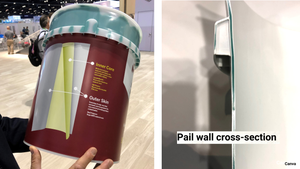Blueprint for the 21st Century: The management challenge
February 1, 2000
Remember the good old days? When once you landed a customer he was your customer for life? When parts were sent as is to the customer? Managing a molding operation is not as simple as it used to be. Decisions today are much larger, carry a greater risk, and provide less reward potential. As part of IMM’s year-long look at the state of molding, we begin this month with an assessment of management. We spoke with three molding execs to get their thoughts on what are the greatest challenges facing managers today.
We talked to Jeff Somple, vp of sales and engineering at Mack Group Inc., a large custom molder and contract manufacturer based in Arlington, VT; Dale Evans, president of Evco Plastics, a custom molder for the appliance market in DeForest, WI; and Rocky Morrison, president of American Technical Molding (ATM), a custom medical molder based in Upland, CA. Although the message from each differed slightly, the core message remains the same: Molders today have to be more creative, thoughtful, energetic, and resilient to remain afloat.
The Front End
During the 1990s molders pushed to add back-end services like assembly, decorating, and packaging. Mack’s Somple believes the challenge for molders now is to add front-end services in design and rapid prototyping.
"In the old days managing growth was relatively easy," says Somple. "You’d look at your customer base and growth rate history and you’d say, ‘OK, I have to add four machines this year and a little more assembly area.’ Now your decision is, ‘Gee, do I have to put in a metal fabrication facility, and do I have to open a molding shop in Brazil, and do I have to buy a prototype house?’"
Evco’s Evans says specialization will be required of molders if they want to grow. "If you try to be all things to all people in a single plant," he says, "all you do is put money in boxes. At our facilities we try to specialize." At ATM Morrison says the challenge is to remain technically astute. "Our customers want us to make their headaches go away," he says. "We probably put more emphasis on technical ability."
However, adding services or expertise is an expensive proposition. "These are big decisions," says Somple, "and the bigger the decisions get, the less you can be wrong. You can’t make many multimillion-dollar mistakes."
Somple also points out that although a molder’s exposure to risk is increased, thanks to shrinking margins the payoff is not what it used to be. "Stakes are bigger, dollars are bigger, decisions are bigger, the risks are much bigger, and the returns, I hate to say it, are smaller," he says. "The whole risk/ reward equation has been turned upside down."
Evans says the standard business model for molders is changing. "On the one hand we’ve got more opportunity than ever before," he says. "On the other hand, we have to be more creative to win those jobs."
Compounding this pressure to succeed is foreign competition. The question is, should a molder join the global marketplace by setting up shop on foreign soil? Mack is establishing a buying office in China. Evco has a moldmaking and molding shop in southern China, and is exploring a joint venture in Mexico. ATM’s Morrison, not far from the Mexico border, is reluctant as of yet to venture south, but acknowledges that low-priced labor impacts his business.
"We do feel more heat from Mexico," he says. "We’re not going to compete for labor-intensive work here. But I think opening a shop in Mexico produces the same problem you have up here, but worse. Finding qualified employees is much more difficult."
Help Wanted
Which leads to the labor market. With the national unemployment rate hovering at 4 percent and the economy in overdrive, finding qualified employees is a struggle. "Traditionally, molding has not been the sexiest business in the world," says Somple. "I don’t think a Harvard MBA is graduating today saying ‘plastics.’"
|
In southern California Morrison says getting good help is costly. "Sometimes you pay a premium to get qualified help, sometimes just mediocre help," he says. "We’ve run ads and gotten no responses."
Evco’s Evans says the unemployment rate in the county in which his company is located is 1.5 percent. "Getting the right people in the right job and keeping them trained is a continuous struggle," he says. "When we get someone in the door to work for us, we have to make sure they’re trained, because we’re going to have to pay them more."
The Long Road
The ultimate challenge for molders is determining the mix of services that will produce the best long-term growth. The choices are astounding, and will be affected greatly by growth of low-wage production facilities overseas.
Somple believes many U.S. molders that implement design services will become product development shops, with some of the production handled in other countries. Others will develop competency in assembly operations where molding is just one of several production processes. "I think we’re in the early to mid stages of a major change that began two to three years ago," he says. "What’s going to be left for the American manufacturer in 10 years that can’t be made a lot cheaper somewhere else? And how do you find what is left and dominate those markets?"
Evans says American molders have to hone their business and creativity skills. "It used to be you just made parts and shipped them out the door—made them to the same specs you always did," he says. "As long as you had quality and kept the price in line, you had the business forever. Now you worry about someone back-dooring you—making a better product and talking your customer into doing it without you even knowing about it."
Contact information Evco Plastics American Technical Molding Inc. |
You May Also Like


